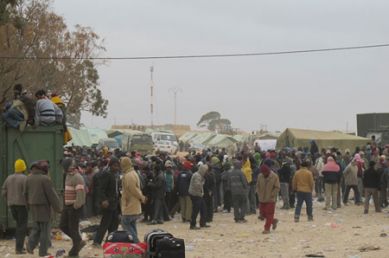Libya: One Million Refugees Might Need Aid

As fighting between Colonel Gaddafi and the rebels in Libya continues to intensify, humanitarian agencies are preparing themselves for up to 1 million refugees that they project will soon be in need of assistance.
On Monday, the United Nations issued a $160 million appeal to prepare for three months of assistance for an estimated 400,000 people leaving Libya - including the 200,000 who have left to date- and another 600,000 people inside the country who are expected to need varying degrees of humanitarian aid.
As of Monday, the UN calculates that 218,010 people have left Libya, including 112,169 who have fled to Tunisia, 98,188 to Egypt, 2,205 to Niger, and 5,448 to Algeria.
And while current conditions for refugees have not yet been deemed a humanitarian crisis, the UN and other organizations are preparing for the worst.
"ACT and the entire UN system must be prepared for a worst-case scenario in which hundreds of thousands of people find themselves forced to flee from a full-blown civil war in Libya," said Jan Schutte of the Action by Churches Together (ACT) Alliance. "We are now working on several possible scenarios, and planning how a coordinated response from the ACT Alliance would give the best results within our areas of core competency."
The ACT Alliance is currently concentrating its efforts in the Sousha refugee camp, located inside the Tunisian border, where around 15,000 people, most of them migrant workers, are now living.
The ACT describes the current atmosphere at the camp as "upbeat," while noting that all of that could change very quickly if hundreds of thousands of more refugees were to cross the border.
Meanwhile, the US and several European countries are considering using naval vessels to deliver humanitarian aid to Libya while deliberations over imposing a no-fly zone in the country without UN authorization continue.
Without UN support for the no-fly initiative, the countries are instead considering rallying several regional blocs, including NATO and the African Union, to back them in their plan.
"If you have the Arab League, the African Union, NATO and potentially the European Union, you have every country within 5,000 miles of Libya," said a NATO official, according to the Washington Post. "That gives you a certain level of legitimacy."
On Thursday, International Committee of the Red Cross President Jakob Kellenberger called the humanitarian situation in Libya "unacceptable" and said that the fighting had reached the point of "civil war."
"Our feeling is that fighting is intensifying and we have to prepare for such a situation," Kellenberger told reporters, according to Deutsche Presse-Agentu. "It is unacceptable that 24 days after fighting started, a major part of the country remains cut off from humanitarian aid."